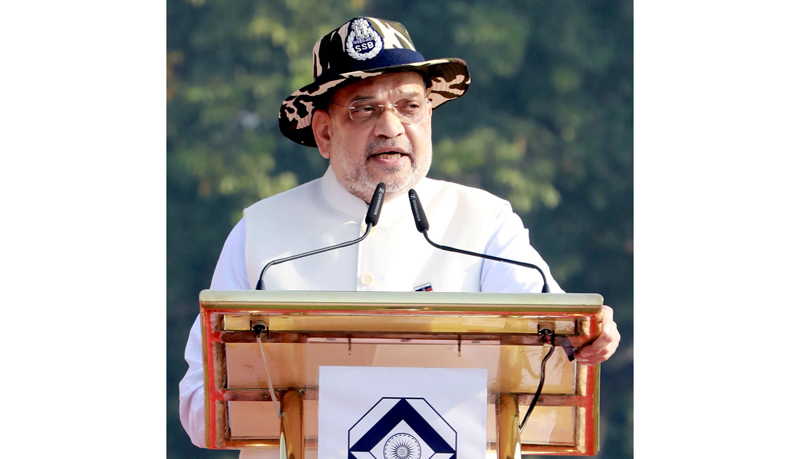‘Terrorism biggest violation of human rights’
Sanjeev Pargal
JAMMU, Oct 21: Union Home Minister Amit Shah said today that situation in major security theatres has improved and it is such in Jammu and Kashmir that those who used to pelt stones earlier have now become Sarpanchs and Panchs and were participating in development activities across the Union Territory.
Describing terrorism as biggest violation of human rights, he said in order to fight cross-border terrorism, cross-border cooperation is very important and all countries must agree on the definition of terrorism and terrorist.
He said this while speaking in two different functions today in the Union capital including National Police Commemoration Day and 90th Interpol General Assembly on its concluding day.
“The situation in Jammu and Kashmir is such that those who used to pelt stones earlier have now become Sarpanchs and Panchs and were participating in development of the Union Territory in a democratic manner,” Shah said.
He added that most of the “hotspots” in the country are almost free from anti-national activities now and the situation in major security theatres has improved over the last eight years of the Narendra Modi Government.
Violence is considerably on decline in Jammu and Kashmir as well as in the States affected by Naxalism, he said.
Describing terrorism as “biggest violation of human rights”, the Union Home Minister, in a veiled attack on Pakistan without naming the neighbouring country, said: “In order to fight cross-border terrorism, cross-border cooperation is very important and, for the purpose, Interpol is the best platform”.
He added that all countries must agree on the definition of terrorism and terrorist.
“The commitment to fight terrorism together and narratives such as good terrorism, bad terrorism and small and big attacks, do not go together,” Shah said, adding: “We also need to achieve consensus on the cross-border propagation of terrorist ideologies through online radicalization”.
Asserting that this can’t be considered as a political problem, he said: “We must all be committed to ensuring that an effective fight against terrorism should be long term, comprehensive and sustainable”.
In this regard, he said, India is committed to work with Interpol to fight all forms of terrorism and provide technical assistance and human resources.
“We have seen in many countries that the Interpol nodal agency and the counter-terror agencies are different. Given this situation, in order to fight terrorism, we will have to bring together all the counter terrorism agencies of the world,” Shah said and requested Interpol to launch an initiative to set up a permanent mechanism for a real time information exchange line between counter-terror agencies of all the member countries.
Shah said over the last 100 years, Interpol has become a very large and effective platform comprising 195 countries, playing a very important role in controlling crime across the world.
“Today, terrorism is a global problem and it is very appropriate that it is the first and most important of the seven global policing goals of Interpol for the period 2020-2025,” he added.
Given challenges such as the emerging trends of global trade in narcotics, and narco terror, Shah said close cooperation is needed between all countries. He mentioned that Prime Minister Narendra Modi on the occasion of 75th anniversary of India’s independence had put forward his vision of a drugs free India.
The Home Minister sought cooperation on platforms for the exchange of information and intelligence; intelligence-based joint campaigns; regional maritime security cooperation; mutual legal assistance; and an effective mechanism to fight money laundering.
He also mentioned how India’s Narcotics Control Bureau has achieved many successes in seizing narcotics, destroying them, and taking cases to their logical conclusion.
Shah mentioned Interpol’s ‘Operation Lionfish’ and India’s ‘Operation Garuda’, saying “I would like to tell you that under ‘Operation Lionfish’, the biggest seizure has been made in India”.
Shah requested Interpol to take the initiative towards setting up a “real-time information exchange network” between the anti-narcotic agencies of all member countries, as well as create an “extensive narco database”.


